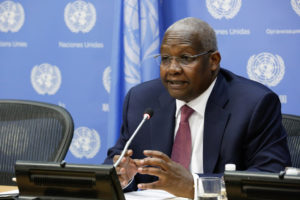With the racial unrest swirling across the United States serving as a backdrop, the United Nations yesterday kicked off the International Decade of People of African Descent, spanning from Jan. 1, 2015, to Dec. 31, 2024, with a goal of confronting the challenges faced by people of African descent across the globe because of pervasive racism against Black people.
While racism and discrimination against people of African descent has been a problem that has infected world societies for generations, this is an auspicious time to commence such a campaign, considering how prominent a topic racism is in the United States. The nightly protests, involving multiracial crowds of angry Americans, occurring across the country to protest police killings and brutality are a shocking development in a country that typically has tried to keep discussions of racism as far from the mainstream as possible. But the grand jury decisions not to indict police officers in the deaths of Michael Brown and Eric Garner, respectively, seem to have awakened outrage among Americans who previously weren’t inclined to see racism as still a major problem in the U.S.
Sam Kutesa, president of the United Nation General Assembly, introduced the International Decade of People of African Descent by declaring that people of African descent still face racism in every country, region and continent of the world.
“Over the next 10 years, people everywhere are encouraged to take part in the global conversation on the realities faced by people of African descent,” said Kutesa, who is from Uganda. “The Decade will allow us to explore the challenges faced by people of African descent due to pervasive racism and racial discrimination engrained in our society today.”
His remarks were reported on the United Nations website, un.org.
The resolution for the international decade was actually adopted a year ago, on Dec. 23, 2013, with the theme “People of African descent: recognition, justice and development.”
Kutesa pointed out that when global societies ensure the protection of the human rights of all people of African descent, it makes a tangible improvement in the lives of millions of people of African descent around the world.
He said people of African descent are “too often” victims of crime and violence, and then face discrimination when they attempt to seek legal redress. It was hard not to consider his comments aimed at the United States, which many countries often accuse of hypocrisy because the U.S. frequently accuses other nations of human rights violations while clearly denying equal rights to Black and brown people inside the U.S.
Kutesa said the international community has also recognized the correlation between poverty and racism, which serves to marginalize people of African descent in world economies, despite the significant contributions people of African descent have made to the development of world societies.
The UN is encouraging nations to assist people of African descent by revisiting policies and practices that have a negative impact on Black people. Kutesa said the coming decade offers the world a chance to “unite our voices” and renew the political will to eliminate racial discrimination against anyone, anywhere.
UN Secretary-General Ban Ki-moon was represented at the kickoff by UN Under-Secretary-General for Humanitarian Affairs, Valerie Amos, who noted that people of African descent suffer from inequality and disadvantage from the history of slavery and as a result are among the poorest and most marginalized around the world, with limited access to healthcare, education and even employment.
Speaking for Ban, Amos called on governments around the world to do more to protect people of African descent from the alarmingly high rates of police violence and racial profiling.
The entire effort is to see that “a decade from now the situation of people of African descent is improved.”
“Human rights belongs to us all,” said UN Assistant Secretary-General for Human Rights Ivan Šimonović, noting that the recent events in New York with the death of Garner and the grand jury decision serve as tragic reminders that people of African descent face disproportionate levels of racial discrimination.
“This Decade aims to shine a light on inequality, invisibility, underdevelopment, discrimination and violence on each and every continent,” the human rights chief said.
During the coming decade, the UN hopes to see the adoption of anti-discrimination laws around the world, in addition to countries fighting against impunity in regard to racial profiling and guaranteeing the equal protection of the law. The Decade will also promote the right to development for people of African descent, which is always a big issue on the African continent, in addition to equal access to education, health, and employment.


